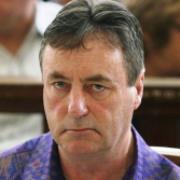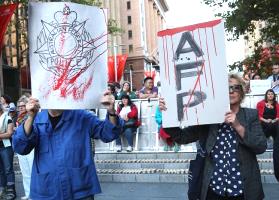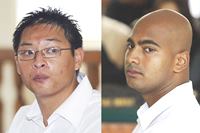|
The AFP Role in Sacrificing 9 Oz Citizens to the Death Penalty in Barbaric Indonesia
by Paul Toohey via judd - News Corp Friday, Feb 6 2015, 8:45am
international /
prose /
post
Until the following article our parent site was one of the very few to run the truth on the intrigues surrounding the arrest of the 'Bali Nine' and the flagrant double dealing of the AFP and the Howard government at the time. It has taken almost a decade for the mainstream to print an accurate account of the story notwithstanding it has refrained from implicating John Howard in the incompetent actions of AFP chief, Mick 'drunken dropkick' Keelty. To put it in one sentence, the responsiblilty for the deaths of two (or more) Oz citizens in barbaric Indonesia rests squarely on the shoulders of John Howard and Mick Keelty -- they should be held accountable for their obvious, inept and tragic crimes.
Whether or not they escape justice today is determined by the national will/awareness (or the lack thereof) however, history has a way of revealing the truth of not only the sell-out of nine Oz citizens but the LIES that Howard told to involve Australia in the first human holocaust of the 21st century in Iraq -- a now known illegal invasion based on concerted LIES and fabrications that resulted in over 1.3 million innocent civilian deaths.

Criminal AFP cop, Mick 'drunken dropkick' Keelty
Bali Nine: The AFP’s role before the Australian members were arrested in Bali and the ill-considered tip-off
IN 2006, 10 months after the Bali Nine were arrested, the Federal Court in Darwin heard a case about whether the Australian Federal Police had acted lawfully in exposing the Australians to the death penalty in Indonesia.
The court found that the AFP had no case to answer for tipping off the Indonesian National Police, or INP, even though its own guidelines cautioned against providing foreign police with information that could expose Australians to execution in a foreign land.
But the moral case against the AFP has never been answered. Even if the Federal Court had found the AFP had acted unlawfully, the court case would have made no difference: the nine were by then banged up in Kerobokan Prison and subject to Indonesian sovereign law.
From the start, it was clear the wider Australian public had little sympathy for the Bali Nine. That never really changed in the nine years leading up to the execution of the two ringleaders, Andrew Chan and Myuran Sukumaran.
Fortunately for the two men, the view of successive Australian governments, along with legal teams in Australia and Indonesia, and sections of the media, was never to approach the case on the basis of what the wider Australian public thought.
But despite all best efforts and persistence in arguing for the men’s lives, nothing could undo the work set in train by the AFP.
From early 2005, the AFP had been watching a group of young men and women, who lived between Brisbane and Sydney, some of whom were known to have made recent trips to Bali, most likely to pick up consignments of heroin.
As members of the group began arriving in Bali in April that year, the AFP decided it would be prudent to tip-off the Indonesian authorities by passing on their knowledge of a major forthcoming heroin buy — even though the drugs were destined for Australia, and the couriers could have been seized on arrival in Australia.
Lee Rush was concerned his wrong-track son, Scott, who had a history of fraud and petty crime, was heading off to Bali to do something bad. Wanting to save his son, he contacted a barrister friend who in turn contacted the AFP, asking them to stop Scott (who was then on bail) from leaving Australia.
The AFP declined to intervene. By that stage, the operation into the heroin-trafficking ring was well underway. Had Scott Rush — who was travelling with fellow Bali Nine arrestee, Michael Czugaj — been prevented from leaving Australia, the drug bosses would no doubt have called off their plans.
The AFP did not want that to happen. They wanted to know every player and every detail of the buy. But it could not afford to risk sending Australian agents into Bali to monitor the transactions, because that would have caused a major problem if they were found to be conducting a clandestine mission on foreign soil.
In a letter dated April 8, 2005 (the same day Rush and Czugaj arrived in Bali), the AFP’s senior liaison officer in Bali, Paul Hunniford, wrote to the INP in Denpasar seeking their assistance in monitoring the activities of the drug gang.
Hunniford requested that the INP not intervene or stage any arrests until the couriers were ready to leave the country: this was because the AFP wanted to use the week or so the drug team still had in Bali to see if they could uncover the identities of any Mr Bigs back in Australia.
Hunniford said that if the Indonesian police suspected that “CHAN and/or the couriers are in possession of drug at the time of their departure that they take what action they deem appropriate”.
In other words, arrest them.
At that time, the AFP had the names of most of the Bali Nine players, plus other proposed couriers back in Australia who never made the fateful journey. It had also pinpointed Chan as the leader of the expedition. But it did not have the full picture.
One key name missing from the AFP’s list was Myuran Sukumaran, who would turn out to be the most senior figure of all the Bali arrestees. While other prospective mules would soon be arrested back in Australia, the AFP tip-off to Indonesia never resulted in any major behind-the-scenes player being held accountable back in Australia, or anywhere else.
From what Myuran Sukumaran told me in a prison visit last year, there were people who were senior to him. But he wasn’t going to say who they were because it would put his family at risk.
Also still missing from the picture is Thai woman Cherry Likit Bannakorn, who was able to depart Indonesia after handing over 8.3kg of heroin to Chan and Sukumaran, even though the INP supposedly had her under observation.
She in still wanted by Interpol.
According to what Sukumaran told me, Chan — who personally collected the drugs from Cherry — never handed her any money: the drugs had already been ordered and paid for beforehand from Australia.
It is possible that the money was paid to a big-time heroin supplier, Man Singh Ghale, a Nepalese resident of Indonesia who was gunned down by police in Jakarta some 10 days after the nine were arrested in Bali.
AFP Commissioner Mick Keelty would say that Ghale was “directly linked” to the Bali Nine operation.
Police found a gun and drugs — reported to be heroin and cocaine — on Ghale, but no money. No doubt, thanks to the AFP tip-off, some Indonesian coppers became rich men out of the Ghale killing.
Keelty always justified the tip-off on the basis that they needed to understand the extent of the operation and needed international cooperation.
He told Chris Masters from Four Corners in 2006 that there were “some very wealthy and influential people sitting elsewhere in the world, who are running all these operations, who are behind all these operations and who are doing very nicely out of it.
“So our focus has always been on the bigger picture.”
But Keelty never did learn the identities of the true masterminds. Whoever they are, they have never been held accountable. And Keelty had some strange remarks about the drug runners doing “damage” in Bali.
This, he said, was “the very place that we tried to help after the Bali bombings, the very place that so many Australians lost their lives during the bombings, the very place that some of our own people, some of our own Australians were trafficking in heroin and not for the first time.”
Keelty was wrong. Their drugs weren’t going to damage Bali. They would do damage in Australia. They should have been arrested here.
But had Keelty let slip what this was really all about? Was handing over the Australians to the Indonesians a misguided trust-building exercise, an attempt to keep the faith after the AFP and Indonesian authorities had worked so well together over Bali 2002?
It was Keelty, not anyone else, who had made the implausible link between Bali Nine and terror. Were they sacrificed to demonstrate to Indonesia that Australia was a trusted ally in all facets of policing?
If so, he’d overlooked something: Indonesia never wanted the Bali Nine. They were an especially unwelcome gift that would give Indonesia a considerable and long-running diplomatic nuisance.
But Indonesia had its strict laws, and it enacted them.
There was always an alternative course of action that did not seem to either occur or appeal to the AFP: a frank discussion with the INP that certain Australians were coming to Indonesia for a drug buy; and a request for its cooperation in monitoring the events, and to let them pass through to
Australia where they would be arrested.
Indonesia could pick up any of its own citizens involved in the racket. And the whole thing could be presented an example of the excellent cooperation in not only terror, but narcotics.
The pitiless among us will say that Chan and Sukumaran knew the risks. And so they did.
But all the AFP ever got from their ill-considered tip-off was two dead men.
© 2015 News Ltd
See also:
http://jungledrum.hopto.org/news/story-1424.html


Chan (left) and Sukumaran facing firing squad
http://tinyurl.com/o7hny4a
<< back to stories
|